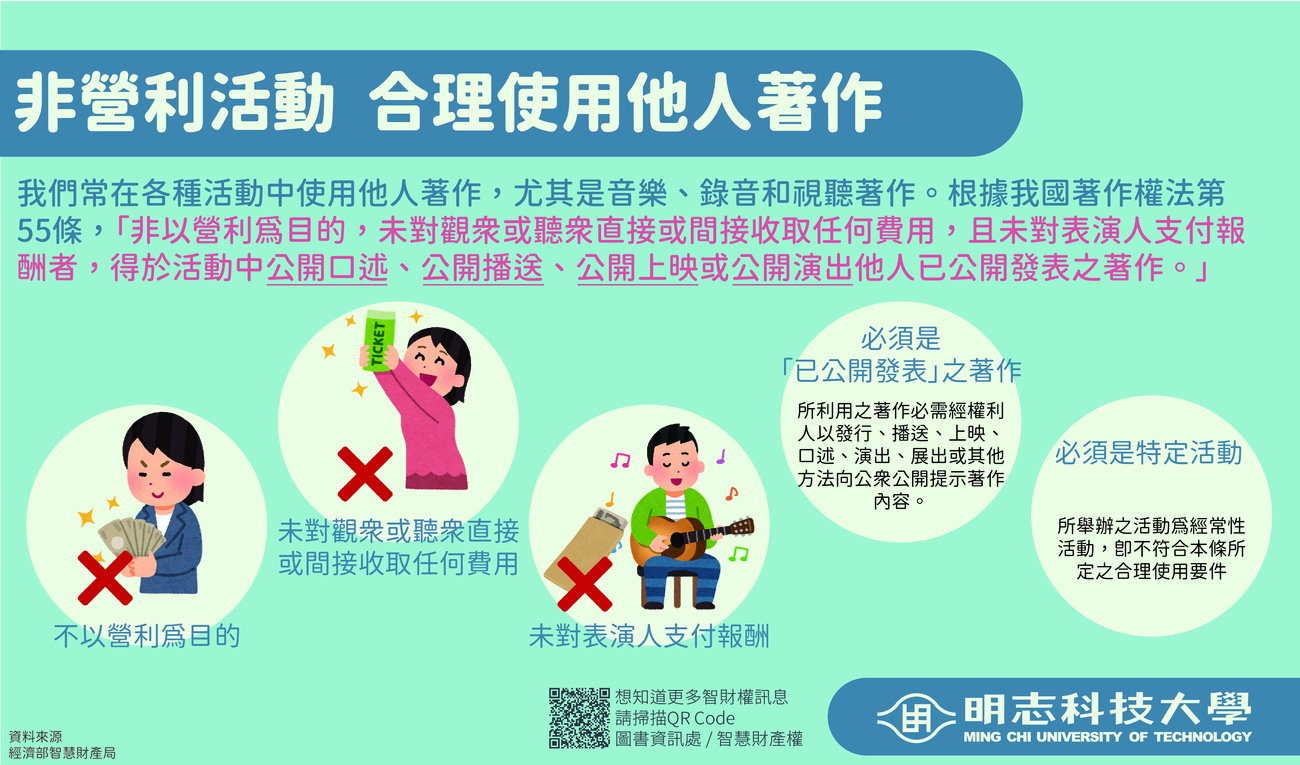【Intellectual Property Advocacy】Non-Profit Activities and Fair Use of Others' Works
Non-Profit Activities and Fair Use of Others' Works
We often use others' works in various activities, particularly music, recordings, and audiovisual works. According to Article 55 of the Copyright Act of Taiwan, "The work of another person that has been publicly released may be publicly recited, publicly broadcast, publicly presented, or publicly performed in the course of an activity of non-profit nature, provided that no fee is directly or indirectly collected from the viewers or listeners, and no compensation is given to the performers."
Non-Profit Purpose: The term "non-profit purpose" does not only refer to immediate economic benefits but also includes potential economic benefits that may be intangible or delayed, such as corporate image activities or activities combining commercial and public interests. For example, playing background music at a "product press conference," even if the organizer does not charge fees to participants or guests, and does not pay remuneration to the performers (because the organizer plays a CD), this press conference is held for economic benefits and thus does not meet the requirements of this provision.
No Direct or Indirect Fees Charged to the Audience or Listeners: This refers to not charging the audience or listeners any entrance fees, membership fees, cleaning fees, service fees, meal (beverage) fees, or equipment fees related to the use of the work, either directly or indirectly. For example, if entrance tickets are obtained through collecting stamps published in newspapers, and the stamps are acquired by purchasing the newspaper, it cannot be said that no fee has been paid to obtain the entrance tickets.
No Remuneration Paid to Performers: This means that no substantial remuneration or consideration is paid to performers for their performance in the activity. Remuneration or consideration may include wages, allowances, commissions, or performance bonuses (excluding lottery prizes). Regardless of the name, if it can be determined that it is equivalent to the value of the performance service, it is considered remuneration. Therefore, if the "travel expenses" (or transportation expenses) paid to performers exceed the standard cost of transportation, it may still be considered remuneration and thus not meet the requirements of this provision. However, if the payment does not have a corresponding value (e.g., a prize for winning a contest), it can be considered "no remuneration paid to performers."
Must Be "Publicly Released" Works: The utilized works must have been publicly released by the rights holder through distribution, broadcasting, screening, recital, performance, exhibition, or other methods to publicly disclose the content of the work.
Must Be a "Specific Activity": If the organizer holds regular activities and uses works during these activities, it does not meet the fair use requirements set forth in this article. For example:
- Playing music from a personally purchased CD in an office during lunch breaks or after work hours for employees does not meet the "fair use" conditions of this article due to regular usage.
- Providing karaoke machines in offices, organizations, or communities for employees or community members to select songs and sing is a regular usage activity and does not meet the "specific activity" requirement.
- Playing music in schools during lunch breaks or between classes is a regular playback situation and does not meet the requirements of this article.
Therefore, when government agencies or companies hold year-end banquets or spring gatherings and invite artists to perform songs with remuneration paid to the performers, the fair use provisions under Article 55 do not apply. Permission or authorization from the copyright holder must be obtained in advance to use the works. However, during these year-end or spring events, if supervisors or employees perform themselves for entertainment, or if "movie screenings" or "karaoke contests" are held for specific festivals or themes, these are considered non-regular specific activities. As long as no entrance fees are charged to the audience or listeners, and no remuneration is paid to the performers, fair use under Article 55 of the Copyright Act can be claimed.
However, if such activities are held in a restaurant, and the restaurant owner has obtained authorization from the copyright holder (such as public screening authorization for audiovisual works or public performance authorization for musical works), the use of the works by government agencies or companies is covered by the authorization obtained by the restaurant, and there is no need to consider whether it meets the fair use conditions. There is no need to pay additional fees. Whether the restaurant absorbs the payment of royalties or passes it on to customers is up to the restaurant to decide. If the restaurant has not obtained authorization from the copyright holder, the activities may still be subject to the provisions of Article 55, regardless of the restaurant's authorization status.
Source | Intellectual Property Office, Ministry of Economic Affairs, Taiwan







